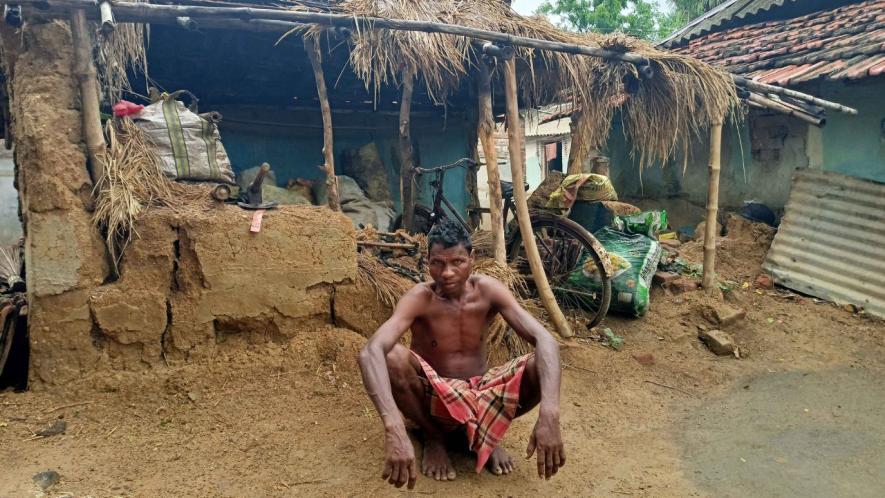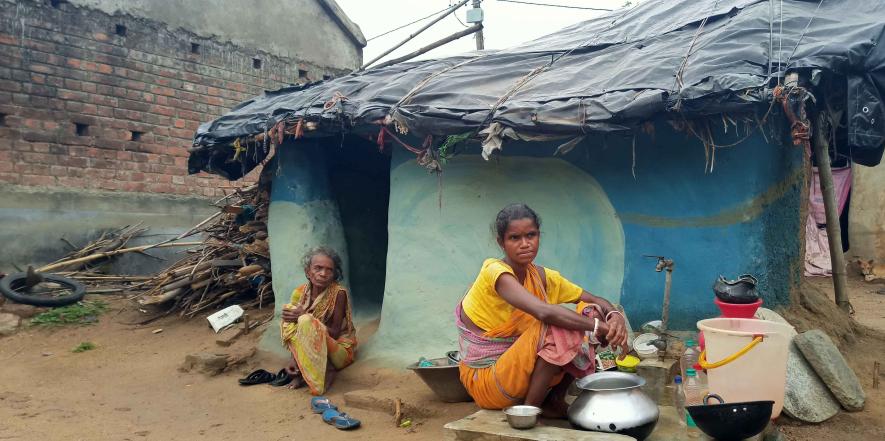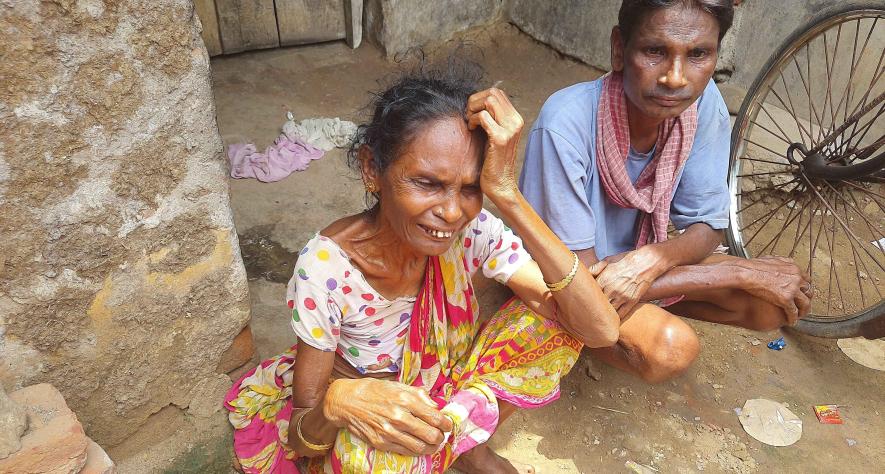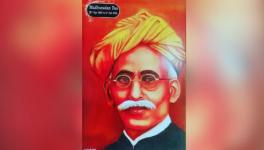Bengal: Villagers Allege Post-Poll Torment in Jangal Mahal

The situation unfolding in Bengal's Jangal Mahal area after the 18th Lok Sabha elections brings to mind a poignant scene from a film by the renowned director Shekhar Chatterjee. Set against the political backdrop of Bengal in the early 1970s, the scene portrays a village landlord, Zamindar Haji Saheb, ordering his henchman to remove his shoes and beat marginalised poor farmers for not voting in his favour. This act of humiliation takes place in front of numerous villagers, starkly illustrating the abuse of power.
In the aftermath of the elections, both the ruling Trinamool Congress (TMC) in the state and the Bharatiya Janata Party (BJP) at the Centre, have allegedly resorted to similar tactics in the Jangal Mahal area, if reports are to believed.
In regions where these two political parties received fewer votes, the local people are being reportedly harassed and abused. This scenario is reminiscent of a scene from the film, Basundhara, where the landlord's henchman abuses farmers under the landlord's orders. Apparently, miscreants supported by the two ruling parties have been committing similar acts across locations.

The jobless family of Uma Bauri at Tantkanali village of Bankura.
The affected individuals (this writer spoke to some of them) said they were bewildered by the abuse they were facing from both the ruling parties. Humiliated and helpless, many are afraid to lodge complaints with the police, fearing inaction or further victimisation. When they approach the police, they are often advised to resolve the issue at the local level, leaving them without any recourse.
The people of the Jangal Mahal area, comprising both tribal and non-tribal communities, are economically disadvantaged. Their social status is low due to their economic vulnerabilities. The TMC-led state government’s indifference has severely impacted their livelihoods, particularly those dependent on forest resources. Concurrently, the BJP-led Central government has halted MGNREGA (100 days rural job guarantee scheme) work for three years, exacerbating the poor economic plight of people in the region.
Despite substantial funds allocated to gram panchayats, panchayat samities, and zilla parishads by the 15th Finance Commission, there appears to be no provision for local employment. Contracts for work are often awarded to outside contractors, sidelining local labour, many residents alleged.
Jobless youths of Jalhari village at Khatra. They wanted to move outside for work as migrant labourers, but the contractor did not agree.
In February 2024, Chief Minister Mamata Banerjee announced the "Karmashree Prokolpo," a 50-day work project for rural Bengal. However, as of now, no funds have been allocated for this scheme, leading to allegations of it being a “political eyewash.”
The dire situation of the jobless population in Jangal Mahal has been overlooked amid celebrations of electoral victories by both the ruling parties. When crisis-hit working class persons demand work, they are subjected to humiliation from both political factions. This neglect highlights a significant gap between political promises made and the ground realities faced by the economically backward communities in Jangal Mahal.
Deplorable Conditions
"From June 5, after the election results were announced, the drinking water supply in our area was stopped. We noticed that the pipeline of the submersible pump was cut. TMC activists did this inhuman act deliberately," Sibu Hansda, a land labourer from Dubukana village in the tribal-dominated deep forest area of Sutan under Ranibandh block, told this writer.
This example of post-election violence is just one among many. In the poor tribal-dominated areas of Tilaboni, Buripal, Churku, and Raigarh villages adjacent to Jhililimili under Ranibandh block, drinking water was supplied by tankerx instead of piped water. However, the day after the election results, these water tankers disappeared.
Urmila Hansda and Jayanti Murmu expressed their distress: "There is already shortage of drinking water in our area, so water was provided by tankers. But we are being punished by turning off the drinking water supply in this severe summer weather because TMC received fewer votes in these villages." Hansda said it was only after local Communist Party of India (Marxist) (CPI(M)) workers went to the water supply office and pressured them, that the department concerned was forced to resume the water supply.
Jobless youth grazing goats at Tantkanali village.
Residents also questioned why they were being made to suffer when TMC had already won by defeating BJP in the Bankura Lok Sabha constituency. Some of them speculated that TMC might have wanted to win all booths, leading to oppression in areas where the Left or other Opposition parties garnered more votes.
Lakshman Mandal, headmaster of Haludkanali Primary School, questioned whether the people of the area had lost their democratic right to vote as they liked.
It is alleged that not only TMC but also BJP activists were mentally torturing people due to getting fewer votes in the Jangal Mahal areas of Bankura, Purulia, and Jhargram.
"During the election campaign, BJP workers and campaigners announced that the Pradhan Mantri Awas Yojana (PMAY) and MGNREGA, which are Central government projects, would be stopped if BJP did not win. Conversely, TMC activists campaigned that if the TMC did not win, social welfare projects like the women's allowance 'Lakshmi Bhandar' and the 'Krishak Bandhu' money would be halted. We were confused," Janardan Mandi and Minoti Baske of Laugrom under Dhanara Gram Panchayat of Raipur Block, Bankura, told this writer.
Maya Sardar of Bandawan, Jhuma Mahato, Dipali Kishku of Manbazar under Purulia district, and Paresh Hansda of Banspahari, Balaram Sardar, and Tapan Mahato of Lodhasuli under Jhargram district shared similar sentiments. All of them are farm labourers. They recalled that three years ago, when MGNREGA and construction of PMAY were stopped, the TMC-led state government and panchayat did not take any measures to continue these projects. They feared that if BJP did not win, these projects would be closed forever.
Political analyst and former head of department of economics at Bankura Sammilani College, Professor Pratip Mukherjee, noted that the poor and marginalised people of these areas were being forced to split their votes between TMC and BJP due to threats of stopping government projects by the two ruling parties.
Working Conditions of Daily Wage Earners
Sagar Badyakar, joint secretary of the Sarabharat Khetmajur Union Pashimbanga Rajyo Committee, said no government or panchayat-initiated work was available across the three districts of Jangal Mahal.

Deceased migrant labourer of Khatra, Bankura Gosto Saini’s mother Sumitra and uncle Aloke Saini
Uddhab Mahato of Jhargram and Rathu Sing of Bandwan in Purulia district described the situation as dire. Previously, people could make a living by using forest resources, but this practice has almost ceased over the past decade under TMC regime, the said. Additionally, work under MGNREGA has also stopped. They alleged that although the BJP won all seats in Jangal Mahal in the 2019 Lok Sabha election, party MPs remained silent on restarting MGNREGA and PMAY projects. The situation has worsened after the polls, with both ruling parties focusing on analysing their vote share.
It is noteworthy that zilla parishads, panchayat samities and gram panchayats receive substantial funding from the Central Finance Commission annually. The 15th Finance Commission is currently in operation, with each gram panchayat receiving at least Rs 70 lakh annually, and block zilla parishads receiving much more. As mauch as 40% of this money, known as the ‘untied fund’, can be used to build infrastructure, like roads, drains and culverts. However, this work is not labour-oriented and is typically done by contractors who deploy machines and workers from outside, depriving local workers of employment opportunities.
In February this year, the Chief Minister announced “Karmashree Prokolpo,” a 50-day work project for rural areas of Bengal. However, according to administrative sources, no funds have been allocated for this project in the current financial year.
Several panchayat employees from the three districts told this writer that as part of the Karmashree project, the 15th Finance Commission, and several ongoing central projects including Grey Water Management (GWM), were being taken up. Those already involved in these projects have been directed to register their names in the Karmashree work list, raising questions about the project's unique identity. However, many believe that this is merely a “political eyewash”.
Jobless mother with her son and daughter at Jalhari village.
A panchayat employee from Purulia district, who wished to remain anonymous, said the Central government had stopped MGNREGA work in Bengal. Meanwhile, the TMC-led state government has not taken any strong initiative to restart the project. There seems to be an intention from both governments to halt this constitutionally recognised largest rural employment project, he alleged.
In this dire situation, many youths and even women are seeking work outside the state as migrant workers. However, they said the labour contractors informed them that there was no work available. And, those who did manage to secure work through contractors, are being forced to accept low wages. It is alleged that the contractors receive money from the authorities concerned for these workers but do not pay the full amount to the migrant workers. Consequently, several middlemen re mushrooming in Jangal Mahal.
Gosto Saini, a youth from Kharta, Bankura, recently died in Muri village of Chhattisgarh, while working as a migrant labourer. He was taken there by a labour contractor from Kharta and was paid only Rs 300 a day.
"A slave system has been reintroduced in Jangal Mahal. There is no work in the area, and extreme exploitation is taking place. The government remains a silent observer," Madhu Sudan Mahato, a resident of Ranibandh in Jangalmahal and a CITU (Centre of Indian Trade Unions) Bankura district leader, told this writer.
When asked about these issues, Nakul Mahato, Additional District Magistrate (General) of Bankura, said the district administration was monitoring the ongoing situation in Jangal Mahal areas and would discuss the matter with higher authorities to address the employment issues being faced by the people.
The writer covers the Jangal Mahal region for ‘Ganashakti’ newspaper in West Bengal.
All pictures taken by Madhu Sudan Chatterjee
Get the latest reports & analysis with people's perspective on Protests, movements & deep analytical videos, discussions of the current affairs in your Telegram app. Subscribe to NewsClick's Telegram channel & get Real-Time updates on stories, as they get published on our website.
























